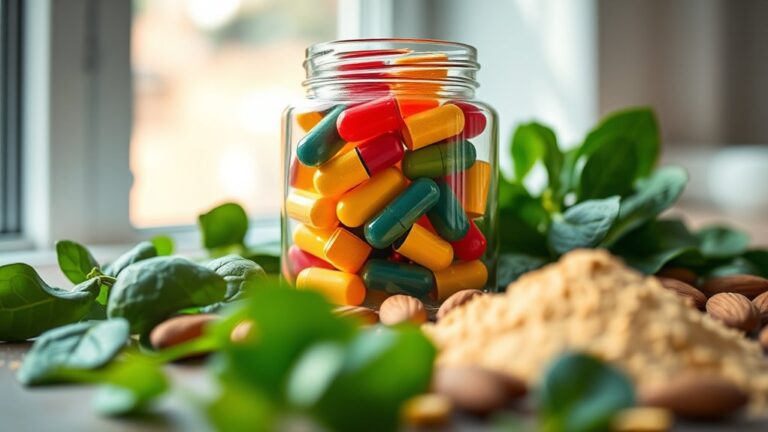How to Naturally Increase HGH (Human Growth Hormone) With Training

To naturally increase your human growth hormone (HGH) levels, focus on high-intensity interval training (HIIT) and resistance training. These workouts boost HGH by engaging muscle and stimulating hormone release. Make sure you’re getting adequate deep sleep for recovery and consider your nutrition—prioritize protein and limit sugars. Managing stress through mindfulness can also help maintain peak hormone balance. If you’re curious about timing workouts and additional strategies, there’s more to explore on maximizing your results.
High-Intensity Interval Training (HIIT) and HGH Production

When you’re looking to boost your human growth hormone (HGH) levels naturally, incorporating high-intensity interval training (HIIT) into your routine can be particularly effective. HIIT methods involve alternating between short bursts of intense activity and periods of rest or lower intensity. This approach not only keeps your workouts interesting but also maximizes the benefits for HGH production.
Studies show that HIIT benefits include increased metabolic rate and improved cardiovascular health, both of which contribute to higher HGH levels. Just 20-30 minutes of HIIT, a few times a week, can stimulate hormone release considerably. You might try sprints, cycling, or bodyweight exercises in intervals to reap these rewards. By engaging in HIIT, you’re not just burning calories; you’re also enhancing your body’s natural hormone balance, paving the way for improved recovery and muscle growth. So, get moving and feel the difference HIIT can make!
Resistance Training: Building Muscle and Boosting HGH
When it comes to increasing HGH, resistance training is a powerful tool. Focusing on compound exercises at high intensity and volume can greatly elevate your hormone levels, but don’t forget the importance of recovery and quality sleep for ideal results. By balancing these elements, you can effectively boost your HGH and enhance your muscle-building efforts.
Compound Exercises Impact
Although many factors influence human growth hormone (HGH) levels, incorporating compound exercises into your resistance training routine is one of the most effective strategies. These exercises engage multiple muscle groups, promoting greater hormone release. Here are four key benefits of compound exercises for boosting HGH:
- Increased Muscle Mass: More muscle means higher HGH levels.
- Enhanced Caloric Burn: They elevate your metabolism, which can stimulate HGH production.
- Improved Functional Strength: Engaging in compound movements mimics daily activities, enhancing overall performance.
- Greater Hormonal Response: The intensity of these exercises triggers a significant hormonal response, further boosting HGH.
Intensity and Volume
Building on the benefits of compound exercises, the intensity and volume of your resistance training play a significant role in maximizing HGH production. To effectively increase HGH levels, consider incorporating high-intensity training methods with a focus on progressive overload. Aim for shorter workout durations with increased weights and fewer rest periods. Here’s a breakdown of effective training parameters:
| Training Method | Intensity Level | Workout Duration |
|---|---|---|
| Heavy Lifting | 80-90% 1RM | 30-45 min |
| Moderate Reps | 70-80% 1RM | 45-60 min |
| High-Volume Sets | 60-70% 1RM | 60-75 min |
| Circuit Training | Varied | 30-50 min |
| Supersets | High | 30-40 min |
Recovery and Sleep
To truly maximize your HGH production, it is essential to prioritize recovery and sleep, as they are critical components of muscle growth and overall health. Here are some effective recovery techniques and sleep hygiene tips to enhance your HGH levels:
- Establish a Sleep Schedule: Go to bed and wake up at the same time daily to regulate your body clock.
- Create a Sleep-Friendly Environment: Keep your bedroom dark, cool, and quiet to promote restful sleep.
- Limit Screen Time: Avoid screens at least an hour before bed to reduce blue light exposure, which can disrupt sleep.
- Incorporate Relaxation Techniques: Try meditation, deep breathing, or gentle stretching before sleep to enhance relaxation.
The Role of Sleep in Hormonal Balance
When you consider the factors that influence hormonal balance, sleep often takes center stage due to its profound impact on hormone regulation, including human growth hormone (HGH) levels. Your sleep cycles are vital; during deep sleep, HGH is primarily released, which is essential for muscle recovery and overall growth. If you’re not getting quality sleep, you might experience hormonal fluctuations that can hinder your fitness goals.
Inadequate rest disrupts the natural rhythm of your hormones, leading to decreased HGH production and increased stress hormones like cortisol. Prioritizing sleep helps maintain a balanced hormonal environment, allowing your body to recover and grow effectively. Aim for 7-9 hours of quality sleep each night, and consider establishing a consistent sleep schedule to optimize your sleep cycles. By doing so, you’ll not only support HGH production but also enhance your overall health and performance.
Nutrition Strategies to Support HGH Levels

While you might focus on exercise and sleep to boost your HGH levels, nutrition plays an equally essential role in this process. To support your HGH production, consider these nutrition strategies:
- Prioritize Protein Sources: Incorporate lean meats, fish, eggs, and plant-based proteins to provide essential amino acids for hormone synthesis.
- Utilize Nutrient Timing: Consume protein-rich meals or snacks around your workout times to maximize HGH release. This means eating protein shortly before and after exercise.
- Limit Sugar Intake: High sugar consumption can spike insulin levels, which may hinder HGH secretion. Opt for complex carbohydrates instead.
- Stay Hydrated: Proper hydration is critical for overall hormonal balance. Aim for at least 8 cups of water daily to keep your body’s systems functioning effectively.
The Impact of Stress Management on HGH Secretion
Although many people overlook the link between stress management and HGH secretion, effectively reducing stress can greatly enhance your hormone levels. High cortisol levels, often resulting from chronic stress, can inhibit HGH production. By prioritizing stress reduction techniques, you can create a more favorable environment for HGH secretion.
Here’s a quick overview of stress management strategies and their effects:
| Strategy | Impact on Stress Reduction | Effect on HGH Levels |
|---|---|---|
| Mindfulness Meditation | Lowers cortisol levels | Increases secretion |
| Regular Exercise | Reduces anxiety | Boosts HGH |
| Adequate Sleep | Enhances recovery | Promotes production |
| Deep Breathing | Calms the mind | Supports balance |
| Time in Nature | Lowers stress response | Improves hormone levels |
Incorporate these strategies into your routine to help manage stress and optimize your HGH levels effectively.
Timing and Frequency of Workouts for Optimal Results

To maximize your HGH levels through workouts, understanding the timing and frequency of your exercise routine is essential. Here are some key points to evaluate for your training schedule:
- Workout Duration: Aim for 30-60 minutes per session. Longer workouts may lead to cortisol spikes, hindering HGH production.
- Frequency: Train 4-5 times a week to maintain ideal hormone levels without overtraining.
- Time of Day: Exercising in the evening can boost HGH secretion during sleep when levels peak.
- Rest and Recovery: Include rest days in your training schedule to allow your body to recover, promoting better hormone balance.
Frequently Asked Questions
Can Supplements Help Boost HGH Levels Naturally?
Yes, supplements can help boost HGH levels naturally. You might consider natural boosters like amino acids, vitamins, and herbal extracts. For example, arginine and glutamine are popular supplement types known for their potential to enhance HGH production. However, it’s crucial to consult a healthcare professional before starting any supplement regimen to verify it’s safe and effective for your specific needs. Combining them with a healthy lifestyle can yield even better results.
What Age Does HGH Production Start to Decline?
HGH production starts to decline around age 30, and this decline can continue as you age. You might notice a decrease in growth hormone levels, which can affect muscle mass, energy, and overall liveliness. By your 40s and 50s, this decline becomes more pronounced, impacting various aspects of your health. Staying active and maintaining a healthy lifestyle can help mitigate some of these effects and support your body’s natural hormone levels.
Are There Specific Foods That Promote HGH Secretion?
Yes, certain foods can promote HGH secretion. You’ll want to focus on high-quality protein sources like lean meats, fish, and legumes, as they provide essential amino acids that stimulate hormone production. Healthy fats, such as those found in avocados and nuts, also play a role by supporting overall hormonal balance. Incorporating these foods into your diet can be a delicious way to help boost your body’s natural HGH levels.
How Does Hydration Affect HGH Levels During Exercise?
Hydration plays a vital role in your body’s performance during exercise, especially at higher exercise intensity. When you’re well-hydrated, your body can better regulate temperature and maintain peak blood flow, which may influence HGH levels. Implementing effective hydration strategies, like drinking water before, during, and after your workout, can enhance your endurance and recovery. This guarantees you’re not just pushing through your workout but also maximizing the potential benefits related to hormone release.
Can Intermittent Fasting Increase HGH Production?
Yes, intermittent fasting can boost HGH production. When you restrict your eating window, your body adapts by increasing hormone levels to promote fat burning and muscle growth. Research shows that fasting can elevate HGH levels considerably, especially during the fasting phase. It’s important to combine this approach with a balanced diet and regular exercise to maximize the benefits. So, if you’re considering intermittent fasting, it might just help enhance your HGH levels naturally.





